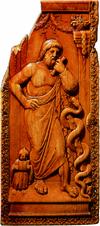- Asclepius
-
/euh sklee"pee euhs/, n. Class. Myth.a son of Apollo and the ancient Greek god of medicine and healing, worshiped by the Romans as Aesculapius.
* * *
Greco-Roman god of medicine.He was the son of Apollo and the nymph Coronis. He learned the art of healing from the Centaur Chiron. Fearful that Asclepius would make humans immortal, Zeus slew him with a thunderbolt. His cult originated in Thessaly and spread throughout Greece. Because he was said to cure the sick in dreams, the practice of sleeping in his temples became common. Asclepius was often represented holding a staff with a serpent coiled around it. Asclepius, from an ivory diptych, 5th century AD; in the Liverpool City Museum, EnglandThe Bridgeman Art Library/Art Resource
Asclepius, from an ivory diptych, 5th century AD; in the Liverpool City Museum, EnglandThe Bridgeman Art Library/Art Resource* * *
Greco-Roman god of medicine, son of Apollo (god of healing, truth, and prophecy) and the mortal princess Coronis. The Centaur Chiron taught him the art of healing. At length Zeus (the king of the gods), afraid that Asclepius might render all men immortal, slew him with a thunderbolt. Apollo slew the Cyclopes who had made the thunderbolt and was then forced by Zeus to serve Admetus.Homer, in the Iliad, mentions him only as a skillful physician and the father of two Greek doctors at Troy, Machaon and Podalirius; in later times, however, he was honoured as a hero and eventually worshiped as a god. The cult began in Thessaly but spread to many parts of Greece. Because it was supposed that Asclepius effected cures of the sick in dreams, the practice of sleeping in his temples in Epidaurus in South Greece became common. In 293 BC his cult spread to Rome, where he was worshiped as Aesculapius.Asclepius was frequently represented standing, dressed in a long cloak, with bare breast; his usual attribute was a staff with a serpent coiled around it. This staff is the only true symbol of medicine. A similar but unrelated emblem, the caduceus, with its winged staff and intertwined serpents, is frequently used as a medical emblem but is without medical relevance since it represents the magic wand of Hermes, or Mercury, the messenger of the gods and the patron of trade.* * *
Universalium. 2010.
